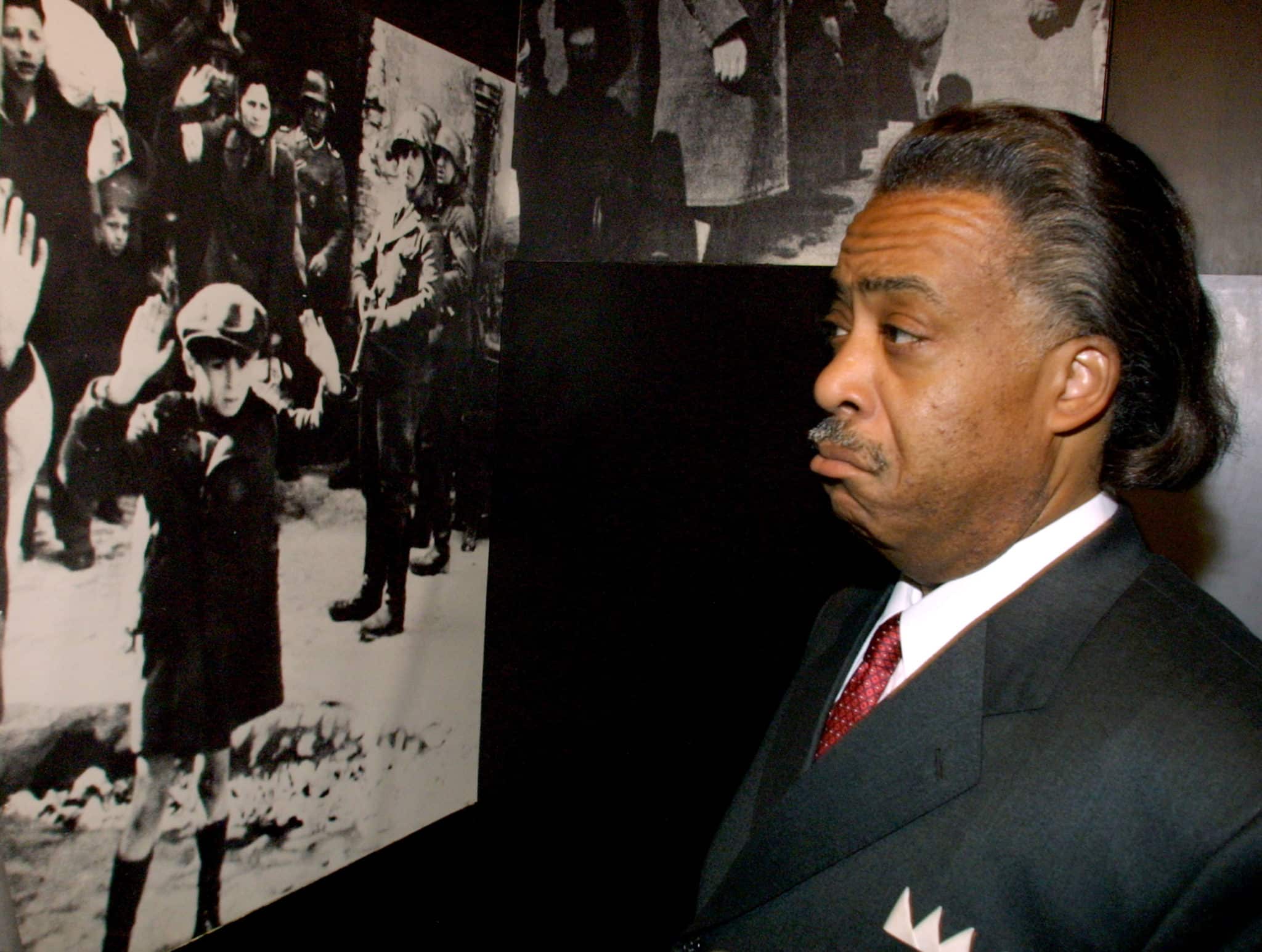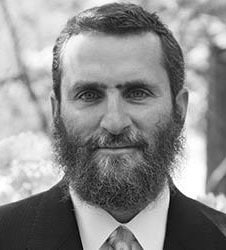 396609 0: Controversial activist Rev. Al Sharpton pauses at a famous photograph of a Jewish boy under Nazi guard on display at the Yad Vashem Holocaust Memorial museum October 30, 2001 in Jerusalem. Sharpton, who is visiting to Israel and the Palestinian Authority, declared that he is not anti-semitic and has always dealt “fairly and squarely” with the Jewish community in his home town of New York. (Photo by David Silverman/Getty Images)
396609 0: Controversial activist Rev. Al Sharpton pauses at a famous photograph of a Jewish boy under Nazi guard on display at the Yad Vashem Holocaust Memorial museum October 30, 2001 in Jerusalem. Sharpton, who is visiting to Israel and the Palestinian Authority, declared that he is not anti-semitic and has always dealt “fairly and squarely” with the Jewish community in his home town of New York. (Photo by David Silverman/Getty Images) Hardly a day goes by without another celebrity taking a hammer to the Black-Jewish relationship. The latest, coming back for seconds, is Whoopi Goldberg, who ironically says she changed her name from Caryn Elaine Johnson to the very-Jewish sounding name is because she feels herself to be Jewish. But in that case, why is she regularly assailing the sacred memory of the six million and minimizing the holocaust. After being suspended by ABC earlier this year for saying on The View that the genocide against the Jews was just white on white violence, she decided to double down in an interview in with the Times of London. In arguing that Jews are not an identifiable ethnicity or race, she said, “It doesn’t change the fact that you could not tell a Jew on a street. You could find me. You couldn’t find them. That was the point I was making. But you would have thought that I’d taken a big old stinky dump on the table, butt naked.”
Personally, I would have been far less offended had she defecated in public, as she suggests, than trivialize the holocaust.
What is critical for the increasingly frayed relationship between African-Americans and Jews is that we not allow people like Whoopi Goldberg and Kanye West to be its spokespeople. Blacks and Jews are, and always were, brothers and sisters. How did we allow it to come to this?
Last week at Carnegie Hall I was joined by America’s foremost black philanthropist and Chairman of Carnegie Hall, Robert Smith, along with Elisha Wiesel, Elie Wiesel’s son, in an event of fraternity and brotherhood that was an inspirational as it was dramatic.
An evening of lights calling for Black and Jewish unity soared into a massive media event marking the birth of a new national movement. Fifteen Days of Light, as we called the project, was made for African-Americans and Jews to find common ground in our similar traditions of lighting candles during the darkest time of the year.
This year, the eight days of Chanukah fall directly adjacent to the seven days of Kwanzaa — a coincidence of calendars which will not re-occur until 2041 — presenting an opportunity for two communities, each with a legacy of triumph through belief in God and His prophets, to illuminate the country with a brilliant candle-lit display of unity.
It began with a full-page ad in the New York Times, produced and paid for by The World Values Network, which I founded to promote universal Jewish values and fight for human rights, calling on all Americans to join the Jewish and Black communities in lighting candles to dispel the darkness of racism and antisemitism in America.
The project was created together with my close friend Elisha and Robert F. Smith, a true friend of the Jewish people and foremost champion of African-American higher education. We were joined by Dr. W. Franklyn Richardson, Chairman of Conference of National Black Churches – which comprises the national leadership of the seven largest historically Black denominations in America – whose voice added untold reach and meaning to our shared-message.
Our call for unity made its way to the nation’s largest newsrooms, with the Black Entertainment Network highlighting our ad as one of the foremost reactions against Kanye West to emerge from the Black community – alongside the comments made by the rap artist Pusha T and also actor Kenan Thompson, who mocked West’s allegiances to Hitler during a Saturday Night Live sketch broadcast the same day as our ad.
On the first night of Chanukah, a week later, the project blossomed into a uniquely uplifting and gorgeous public Menorah-lighting in New York City’s Carnegie Hall.
Elisha Wiesel, Robert Smith and I were joined by New York City Mayor Eric Adams, who spoke beautifully, declaring that the light we spread by combating Jew-hatred in the nation’s largest city would eventually “cascade throughout the entire country.”
Carnegie Hall CEO Sir Clive Gillinson and his wife Anya, dear friend with whom we spend many a Friday night, were instrumental in organizing the moving and memorable evening, which also drew the influential clergyman and media personality Rev. Conrad Tillard, who once ran Mosque Number 7 in Harlem for the Nation of Islam, the same that was headed by Malcolm X before he, like Conrad, broke with the Nation.
The Rev. Al Sharpton, whom I invited, joined as well. Many objected to the invitation and a prominent Jewish organization withdrew its participation. But Sharpton – or Rev. Al, as I refer to him, ever since I took him, together with Shimon Peres, to Israel in 2001 – deserves a lot of credit. Even his detractors admitted that he gave a profoundly eloquent denunciation of antisemitism and articulated a vision of Blacks and Jews fighting bigotry and racism together.
Insisting in his address that, “There is never a time more needed than now for Blacks and Jews to remember the struggle that we’ve gone through,” he added, “I cannot fight for Black rights if I don’t fight for Jewish rights.”
Each of the speakers lit their own Menorah, celebrating Chanukah and standing with the Jewish community amid a national explosion of antisemitism.
Meaningful moments of unity are rarely achieved without controversy, however, and many within my own Chabad community took issue with Rev. Sharpton for not adequately apologizing for his role in the Crown Heights Riots of August 1991.
When I first met and befriended Al Sharpton nearly twenty years ago, I was aware of his reputation in the Jewish community and challenged him to a debate. He shocked me by accepting and our debate was a take-no-prisoners explosive exchange held in a midtown Church. When it was over and we were both thoroughly exhausted, I invited him to a Kosher Steak House in Manhattan. Again, he shocked me by accepting. A friendship ensued and right after the 9/11 attacks, I invited him to Israel for a solidarity trip with Israeli victims of terror, which Shimon Peres, then Israel’s Foreign Minister, agreed to co-host.
In the years since, Sharpton has come closer to the Jewish community, drawing headlines in 2019 for publicly admitting that he could have “done more to heal rather than harm” during the Crown Heights Riots and recounting the rebuke he received over the affair from Civil-Rights legend Coretta Scott King.
Last month, while Candace Owens – who is employed by one of our nation’s most recognizable Orthodox Jews, Ben Shapiro – was defending Kanye West and lambasting Adidas for cutting ties with him, Sharpton went on MSNBC to defend Adidas and lambast West.
“How many times is he going to cross the line, and now even having banners raised saying and praising him as being antisemitic,” Sharpton told Joe Scarboro, “and you going to have him advertise your product?”
Sharpton also defended the Brooklyn Nets for suspending Kyrie Irving over his refusal to apologize for promoting a decidedly antisemitic and holocaust-denying documentary on social media, telling TMZ, “We’ve got to be consistent, and if people say things wrong, they need to be held to the same account that we know when people say things wrong about us.”
Sharpton’s decision to show up, light a Menorah with me, Robert, and Elisha and publicly condemn antisemitism at our event should be met with a reciprocal degree of warmth. As major Black figures like Kanye West and Whoopi Goldberg seem intent on driving an insurmountable split between Black and Jewish people, the war being waged for communal unity demands all hands on deck.
Over the past few weeks, I witnessed a major effort between friends turn into a national event before sparking a global media movement. I saw that goodness, too, gains steam and that brotherhood ְְ– and not just hate – makes for fine clickbait. Caught as we are within a great battle for the Jewish future in America, this luminous Chanukah season leaves me feeling hopeful. will spend this week, now that the eight nights of Chanukah are over, lighting a Kinara for Kwanzaa in solidarity with my African-American brothers and sisters, who struggle for the fullest acceptance of their humanity is one that we Jews know all too well.
Rabbi Shmuley Boteach, “America’s Rabbi” whom the Washington Post calls “the most famous Rabbi in America,” is the author of “Holocaust Holiday: One Family’s Descent into Genocide Memory Hell” and “Kosher Hate.” Follow him on Instagram and Twitter @RabbiShmuley.





















 More news and opinions than at a Shabbat dinner, right in your inbox.
More news and opinions than at a Shabbat dinner, right in your inbox.